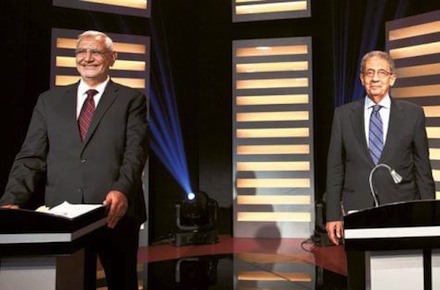As The Guardian pointed out earlier today, Muslim Brotherhood presidential candidate Mohammed Morsi, who appears to have finished first in this week’s Egyptian presidential election, posted a long, rambling video in English earlier this month.![]()
You can see why some people have called him charisma-challenged, even taking into account that English is not his first language (although he did live in California as an academic for the better part of a decade).
But if, indeed, the runoff shapes up as a contest between Morsi and former Mubarak prime minister and Air Force commander Ahmed Shafiq, you’ll see a lot of people lunging toward Morsi as the only possible candidate.
To keep from erasing the gains of Egypt’s revolution, revolutionaries and liberals and secular reformers and pro-democracy forces will all have to swallow their anxiety about the Muslim Brotherhood, about joining hands with Salafists, about Morsi’s statements about making Egypt a more Islamic society.
Although returns from Cairo and Giza are not totally in, and there’s some hope that neo-Nasserist / leftist / nationalist Hamdeen Sabahi could eke out a surprise leap into second place, most news sources in Egypt are reporting that the Morsi-Shafiq runoff is all but settled.
Even today, in the most unlikely commentary I’ve seen so far, Elliott Abrams, a top foreign policy official Bush administration, has written a piece in The Weekly Standard entitled ‘Two Cheers for Morsi’, making the obvious, yet staggering point, that Mubarak well could have engineered a transition to Shafiq without Egypt having gone through the Tahrir Square protests and the ensuing 15-month drama:
There would be a historic irony if Shafik were to end up as president of Egypt. Had Mubarak and the Army played their cards better, Shafik might have been Mubarak’s successor without the uprising that Egypt has experienced. Had Mubarak realized and stated publicly that at 82 he could not run again, and said that Egypt was not a monarchy (or a fake one like Syria) and that his son Gamal would not succeed him, I believe the Egyptian revolt would never have taken place. Mubarak and the Army could have agreed on Shafik as their candidate: He was close to Mubarak and like him an Air Force general, and, as we now see, he is indeed the man the military have agreed should run and represent their interests.
As a spokesman for Shafiq rather chillingly told The New York Times today:
“The revolution has ended,” he said. “It is one and a half years.”
Not out of affection for Morsi or zeal for Islamists, but rather out of the recognition that a vote for Shafiq is a vote to betray the revolution, the refrain in the coming days from many corners is going to be: We’re all Muslim Brothers now.

